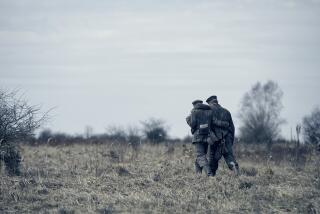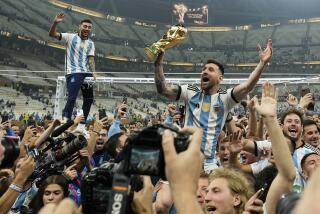Across a More Unified Europe, National Pride Takes the Field
- Share via
BERLIN — The Croats are tanned, the Swedes pink, the Poles the color of powder. They hoist the flags of their nations and trundle like tiny, sweating armies beneath the sun. The beer comes in big cups, and the boats on the River Spree glide past with music and accents of Italian, French and German.
The World Cup is at once a symbol of globalization and an ode to patriotism. On a continent where the European Union is merging economies and loosening borders in an atmosphere of oneness, the monthlong soccer tournament is a chance to fly the colors of your land and root for the victory of your countrymen.
Even the Germans, whose past makes them timid about expressing national pride, are sticking flags on their backpacks, bikes and cars and rollicking through their cities in gleeful fervor. The World Cup allows such sentiment; it is a celebration where teams represent nations instead of franchises, and where small, poor countries can battle for bragging rights against larger, affluent ones.
“My home of Croatia has only 4.5 million people, and this is a chance for the world to look at us,” Tomislav Lackovic said as he walked with his buddies, draped in red and white Croat colors, toward a beer garden and a big-screen TV. “We are so small, yet we are competing against the biggest and richest in the world.”
His friend Dubravko Milak added, “Yes, but unfortunately we play Brazil first.” (Croatia lost its opening match to the tournament favorite by a respectable 1-0).
European nationalism has a virulent history, leading last century to two world wars and the breakup of Yugoslavia. The continent is a happier, calmer place these days and, for the most part, nationalist slogans are limited to populist and right-wing opposition to immigration. The world’s danger zones have long shifted to new geographies, and a Europe that once pondered Cold War missiles is these days perplexed in trying to define what it means to be European.
European nations in recent years have sacrificed bits of their identity to join the European Union: Germany gave up its beloved deutsche mark for the euro, Italy had to contend with new regulations on its wine and pecorino, the French had to endure questions about their foie gras, and the Poles had to accept the prospect that God would not be mentioned in the yet-to-be-ratified European Constitution.
The Brits infuse more of an edge to their European skepticism, most notably when it comes to Germany. Although much of the World Cup is sans politics, England’s soccer fans were told it would be good manners not to sing their chant chiding Germany about English victories. It goes like this: “Two world wars, one World Cup.”
The aloof Scandinavian countries are suspicious of the European Union, including Sweden, which has not betrayed the krona for the euro. Icy, windy northern Europe enjoys its socialized institutions and financial tidiness and doesn’t like the idea of being roped into an alliance with Greece, Italy and other chaotic spendthrifts.
At times seeming like the fictional idealist Don Quixote, the European Union is meeting again this week to revive the grand vision of drawing a continent of 450 million people closer with a common purpose. All the chatter about European identity and parables of unity, however, are brushed aside once the soccer cleats bite into the pitch and the game begins.
“I don’t think of myself as a member of the European Union; I think of myself as a Swede,” said Carl Stenbacken, standing with other fans outside Berlin’s new train station. “I’d rather be called a Scandinavian than a European Unionist. Scandinavians are different. Sweden is the only Scandinavian country in the Cup, but other Scandinavian countries are supporting us. Just because I live in Europe, I don’t necessarily think I’d cheer for Germany if it played Brazil in the finals.”
His friend Magnus Lindblad agreed. “Scandinavians, we stand up for one another.”
That kind of pride has been muted in Germany since the end of the Nazi era. The nation went through denial, guilt, anger, atonement and acceptance. Symbols of identity were seldom raised, and patriotism was further complicated by the split of the country into democratic west and communist east. Unification brought worries of a nationalist resurgence, but such fears never materialized, especially as younger generations rejected the harness of the past.
The World Cup has underscored a recent trend of Germans seeming more at ease in their skin. They are embracing who they are in a cultural, not political, sense.
There is a degree of ambiguity: One newspaper poll found that 68% of citizens were wary of public patriotism; a magazine survey found that 61% were in favor of it. Shops and taxicabs gleam with the country’s flags and colors of red, black and gold. Germans are wearing face paint and laughing; they are singing and pointing out directions to 1.5 million visitors.
“I think it’s the new generation. My generation wouldn’t do that,” said Klaus Juergen Liedtke, a literary translator, noting the preponderance of national spirit and German flags. “It has spread so fast. The atmosphere is relaxed. It’s not aggressive or frightening at all.... In a way, people want to get rid of past problems and to relax and get away for a month and have fun with all the others.”
The Stuttgarter Nachrichten newspaper wrote: “It’s as if Germany was just waiting to prove to all the world that it had all been a big misunderstanding that we’re obviously not as grouchy, anxious and pig-headed as we always seem to think we are.”
Paul Nolte, a modern history professor at Berlin’s Free University, said, “Sometimes things just need an occasion to come out. Those waving the flags are asserting not nationalism but a joyous patriotism that reaches out and shakes hands with the world. For so long, our national symbols were discredited.
“The question is, what is the context of this feeling? What does it mean? Hopefully, it’s a chance that it becomes the symbol of a democratic, tolerant and open society.”
The World Cup is open and often amusingly tolerant. It is a moment when a Finn can paint himself blue and race through the boulevard leading to the Brandenburg Gate, past Poles painted red and Dutch painted orange, past flags snapping in trees and songs drifting into the dusk, a time when a German with a Dr. Seuss hat dyed in his native colors sips a beer and looks to a gigantic TV where a ball arcs toward a net with incredible speed.
More to Read
Sign up for Essential California
The most important California stories and recommendations in your inbox every morning.
You may occasionally receive promotional content from the Los Angeles Times.














